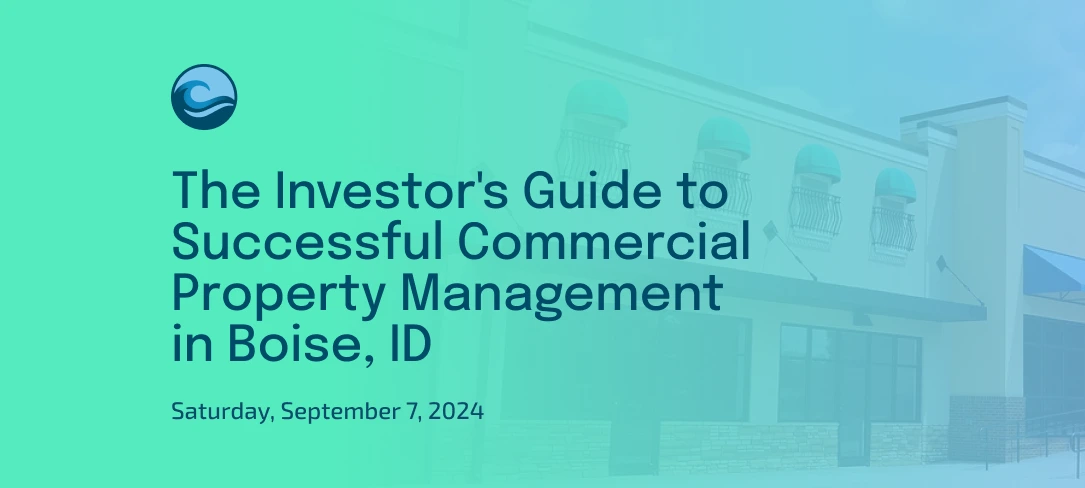Boise, Idaho, is emerging as a prime location for commercial real estate investment, thanks to its thriving economy, vibrant growth, and increasing demand for commercial spaces. As an investor looking to capitalize on the opportunities in this burgeoning market, effective commercial property management is crucial to maximizing returns and ensuring long-term success. This guide will walk you through the essential aspects of successful commercial property management in Boise, providing practical insights and strategies to enhance your investment.
Understanding Boise’s Commercial Real Estate Market
Boise's commercial real estate market is characterized by a diverse range of properties, including office spaces, retail units, industrial facilities, and multi-use developments. The city's economic growth, bolstered by a strong job market and an influx of new residents, has spurred demand for various types of commercial spaces. Key sectors driving this demand include technology, healthcare, and retail, making Boise an attractive location for commercial property investments.
Before diving into property management, it’s important to understand the local market dynamics. Research current trends, vacancy rates, rental rates, and the performance of different property types. This knowledge will help you make informed decisions and develop strategies tailored to Boise’s unique market conditions.
Developing a Comprehensive Management Plan
A well-structured management plan is the cornerstone of successful commercial property management. Your plan should encompass several key components:
1. Property Maintenance and Repairs
Routine Maintenance: Establish a schedule for regular inspections and maintenance tasks, such as HVAC servicing, landscaping, and cleaning. Preventative maintenance can help avoid costly repairs and ensure that your property remains in good condition.
Emergency Repairs: Develop a system for addressing emergency repairs promptly. Having a network of reliable contractors and service providers can minimize downtime and tenant dissatisfaction.
2. Tenant Relations and Retention
Communication: Maintain open lines of communication with tenants. Address concerns and requests promptly to build strong relationships and encourage lease renewals.
Lease Agreements: Draft clear and comprehensive lease agreements that outline terms, responsibilities, and expectations. This can help prevent disputes and ensure that both parties are on the same page.
3. Financial Management
Budgeting: Create a detailed budget that includes operating expenses, maintenance costs, property taxes, and insurance. Regularly review and adjust the budget as needed to accommodate changes in expenses or income.
Rent Collection: Implement a streamlined rent collection process. Offer convenient payment options and follow up on late payments to maintain a steady cash flow.
4. Marketing and Leasing
Market Analysis: Regularly assess the local market to set competitive rental rates and attract potential tenants. Consider factors such as location, property amenities, and market trends.
Advertising: Utilize various marketing channels, including online platforms, real estate networks, and local advertising, to promote your property. High-quality photos and detailed property descriptions can enhance your marketing efforts.
Navigating Boise’s Regulations and Compliance
Boise has specific regulations and zoning laws that impact commercial property management. Familiarize yourself with local building codes, zoning regulations, and other legal requirements to ensure compliance. Key areas to consider include:
1. Building Codes and Safety Standards
Inspections: Ensure that your property meets all safety standards and passes required inspections. Regularly review and update safety measures, such as fire alarms, sprinklers, and emergency exits.
2. Zoning Regulations
Land Use: Understand the zoning regulations that apply to your property type. This includes permitted uses, restrictions, and any necessary permits for renovations or changes in property use.
3. Environmental Regulations
Compliance: Stay informed about environmental regulations that may affect your property, such as waste disposal, energy efficiency, and water usage. Implementing sustainable practices can also enhance your property’s appeal to environmentally-conscious tenants.
Leveraging Technology for Efficient Management
Technology plays a vital role in modern property management. Utilizing software and tools can streamline operations, enhance efficiency, and improve tenant experiences. Consider incorporating the following technologies:
1. Property Management Software
Features: Invest in property management software that offers features such as lease tracking, maintenance request handling, financial reporting, and tenant communication. This can simplify administrative tasks and provide valuable insights into property performance.
2. Online Portals
Tenant Access: Provide tenants with access to an online portal where they can submit maintenance requests, view lease details, and make rent payments. This convenience can enhance tenant satisfaction and reduce administrative workload.
3. Marketing Tools
Listings: Use online listing platforms and social media to promote your property. Implementing virtual tours and high-quality visuals can attract potential tenants and showcase your property effectively.
Building a Strong Team
Successful commercial property management often involves working with a team of professionals. Consider the following roles and partnerships:
1. Property Manager
Responsibilities: A skilled property manager can handle day-to-day operations, tenant relations, and maintenance tasks. Look for someone with experience in commercial property management and a strong understanding of Boise’s market.
2. Real Estate Agents
Leasing and Sales: Partner with real estate agents who specialize in commercial properties. They can assist with leasing, market analysis, and property acquisition, helping you make informed decisions and attract quality tenants.
3. Contractors and Service Providers
Maintenance and Repairs: Build relationships with reliable contractors and service providers for maintenance, repairs, and renovations. Having a network of trusted professionals can ensure that your property is well-maintained and responsive to tenant needs.
Measuring Success and Adjusting Strategies
Regularly evaluate the performance of your commercial property to ensure that your management strategies are effective. Key performance indicators to monitor include:
1. Occupancy Rates
Vacancy: Track vacancy rates and identify any trends or issues affecting tenant retention. High vacancy rates may indicate the need for adjustments in marketing strategies or lease terms.
2. Financial Performance
Income and Expenses: Review financial reports to assess income, expenses, and overall profitability. Identify areas where costs can be reduced or revenue can be increased.
3. Tenant Satisfaction
Feedback: Collect feedback from tenants to gauge their satisfaction with property management, maintenance, and overall experience. Address any concerns and use feedback to improve management practices.
Achieving More with Wave Property Management
Successful commercial property management in Boise, ID, requires a strategic approach, a deep understanding of the local market, and effective use of technology and resources.
That’s why at Wave Property Management, we prioritize developing a comprehensive management plan, staying compliant with regulations, leveraging technology, and continuously evaluating performance. With our help, you can optimize your commercial property investments and achieve long-term success. Contact us today to learn more.



